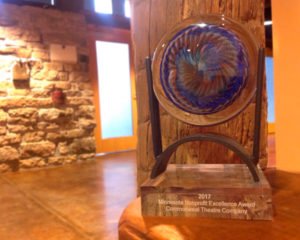The beginning of each season at the Commonweal, and this one was my sixth, seems a daunting prospect for all of us involved. It means many hours in the theatre, many hours with our heads in scripts, many hours fielding box office phone calls and many days when it does not seem worthwhile. And then the season becomes a whirlwind and comes to a close before we know it. The final week of each season turns into a period of reflection as we realize just how many lives we’ve touched and the great memories made in that process. Without further ado, the highlights of Season 29 for CWL company members.
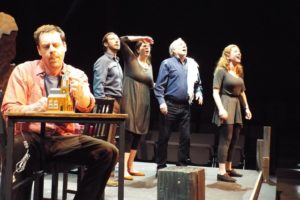
The Last Two Minutes of the Complete Works of Henrik Ibsen
David Hennessey: Sending up 20 years of Ibsenfest with The Last Two Minutes of the Complete Works of Henrik Ibsen, especially using a “death toll” chalk board; outstanding one-actor shows—Lewis Youngren in his apprentice capstone I Am my Own Wife and Brandt Roberts in The Art of the Entertainer at Lanesboro’s St. Mane Theatre; the pinheads lullaby to Merrick as he dies and watching him rise from his deathbed to cross over in The Elephant Man; M’Lynn’s emotional breakdown at the conclusion of Steel Magnolias; Christmas Past in The Trial of Ebenezer Scrooge enjoying herself on the witness stand; winning the Nonprofit Excellence Award from the Minnesota Council of Nonprofits.
Ben Gorman: The whole production of The Elephant Man.
Adrienne Sweeney: The very best thing about this season, for me, is the new patrons I have met that have become friends. Perhaps because I was in 3 of the 5 shows, I feel like I met a lot more folks this year, be they first-timers, new season pass holders or people who attend regularly but I just haven’t had the chance to meet. The conversations I have had at Encore and opening night parties, in the lobby and sometimes even in restaurants and shops, have reminded me that what we do is vital and the human connection is so powerful.
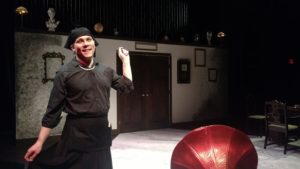
I Am My Own Wife
Philip Muehe: As the director, seeing I Am My Own Wife come together so well. It was a long and intense process, and both Lewis and I were pushed to our limits. But watching that first audience respond so positively was an experience I won’t ever forget. Chatting with people about the show and what it meant to them was so humbling. The fact that opening night was Charlotte’s birthday made it all that much better. Very thankful for the support from our patrons and the entire company!
Hal Cropp: The amount of use that the typewriter exhibit got after every Ghost-Writer performance. It was terrific to see all the people engaging in real typewriting, especially younger people who didn’t even have a clue what a typewriter was! The four glorious weeks of fun in the rehearsal room getting The Trial of Ebenezer Scrooge on its feet, from Philip Muehe’s mastering gibberish AND drywall stilts to Jeremy van Meter’s discoveries of how to irritate David Hennessey’s Judge to Elizabeth Dunn’s sheer joy as Christmas Past to Eric Lee’s very fey Marley to Ben Gorman’s poker face to Abbie Cathcart’s delightful flirt Harriet Dilber to Megan Hanks’ blithely unaware Bailiff—just a joy everyday!
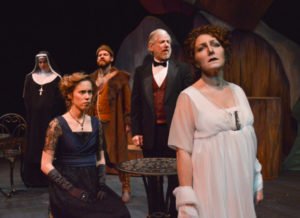
When We Dead Awaken, 2017
Elizabeth Dunn: Enjoying (and having many successful) student matinees and workshops. Especially our When We Dead Awaken matinee for students from Mayo H.S. Best. Teens. Ever. Second is the ensemble in our production of The Elephant Man. And finally, being a part of the last Ibsen production within the annual commitment.
Megan Hanks: One of my absolute favorite activities from this year was playing with theatrical masks at company class, or “Playground.” There is so much talent and creativity in this company! It was awesome to see everyone just let loose and go crazy behind the mask. Although it seemed tedious at the time, looking back I warmly recall searching for the play we’d chose to be our apprentice capstone. I love cold reading scripts out loud, especially with talented and dedicated peers. I love the in-school workshop program offered by the Commonweal as part of education outreach. I had an awesome time visiting schools and work-shopping with hundreds of students! It is so important to keep children and young people excited about theatre, and it was such a joy to have been a part of that this year!
Stela Burdt: So many patrons moved to tears by The Elephant Man and Steel Magnolias.
Abbie Cathcart: I loved being in the rotating rep of Steel Magnolias and The Elephant Man. It was a total blast. Performing and directing in the Waterways 10-minute play fest. It was a bit of a blur, but also super fun. Finally, getting to do like 5 different accents/dialects in one season was challenging and great fun.
Amanda Pyfferoen: The highlight of my year was working on I Am My Own Wife. Having the privilege to tell Charlotte’s story of her strength, determination, humor, love, and zest for life is a memory I will cherish for the rest of my life. Charlotte was not afraid to live her life “as is” and that mentality has inspired me to do the same. Philip’s (Muehe) masterful direction of Lewis’ (Youngren) exquisite performance was a joy to watch each night. From the bottom of my heart, danke Charlotte.
Bailey Otto: Watching the many different versions of Steel Magnolias that came with having 3 regular understudies. And seeing Philip learn to be comfortable on stilts for his Ghost of Christmas Future in The Trial of Ebenezer Scrooge.
Megan Pence: Reuniting Brand & Gerd in The Last Two Minutes of the Complete Works of Henrik Ibsen. Directing The Elephant Man with an overwhelmingly talented group of actors + an incredible script + beautiful designs = an extraordinarily fulfilling project. Getting to play in Truvy’s beauty salon for a few performances of Steel Magnolias as both M’Lynn & Truvy – both extremely challenging roles in but in completely different ways.
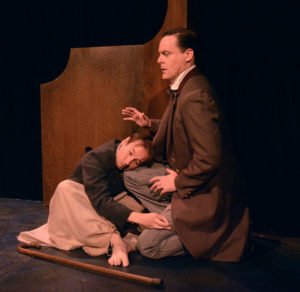
Brandt Roberts and Jeremy van Meter as Merrick and Treves in “The Elephant Man,” 2017
Brandt Roberts: One of the most rewarding aspects of this season was the chance to portray Joseph “John” Merrick in The Elephant Man. It was a labor of love for me and it taught me so much about humanity and what is important in the vapor of a life. Next, serving as the props designer for The Trial of Ebenezer Scrooge called for tools and expertise that were beyond what I could do at the Commonweal proper. As a result, I got to work with local artisans Don Bell and Anna Loney in their shop right here in Lanesboro. I learned a ton and forged deeper friendships. It was thanks to their help that a magic lantern projector came into existence on the stage. And then there was the spit-take into Jeremy’s face during The Last Two Minutes of the Complete Works of Henrik Ibsen. I always managed to release a lot more water than was needed!
Patrick Vaughn: Listening from the lobby to the laughter of happily captive audiences during Steel Magnolias, The Trial of Ebenezer Scrooge, and Myra and Franklin’s editing sessions in Ghost-Writer. Finding out how effective mirroring the behavior of certain animals can be in creating multiple separate and distinct personalities for a multi-character track in The Elephant Man. Not only doing it myself in the rehearsal process but getting to watch other cast members doing it—that was fascinating.
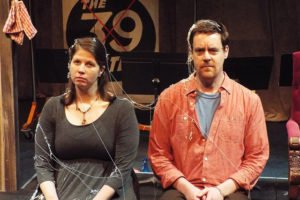
The Last Two Minutes of the Complete Works
of Henrik Ibsen
Jeremy van Meter: Being sprayed with an avalanche of Silly String along with Megan Pence during the limited and hysterical run of The Last Two Minutes of the Complete Works of Henrik Ibsen. And every performance alongside my amazing colleagues in The Elephant Man.





